After a slew of more common ukuleles on Got A Ukulele it's always nice to feature something brand new to me and rather different. And that is certainly the case with this Boatpaddle Tenor Ukulele from Brogärde Instrument in Sweden.
Brogärde are the brand of a ukulele builder called Markus Sontheimer based south of Stockholm at Järna, Sweden (a beautiful part of the world, I must say!). He got in touch recently and suggested a review and when I saw images of his work I was never going to say no. He bills himself as a 'hobby luthier' though I have seen enough people claim that tag when they turn out to be anything but (largely speaking, most uke builders are overly humble about their craft). Anyway, after customs glitches this one arrived safely. Markus builds from a home workshop and the name 'Brogärde' is the name of the old farm he lives on and has a small workshop. In another nice touch to the story, his logo is a Horse Chestnut leaf because he likes to use local woods and he has an old Horse Chestnut tree growing next to his building space. More on that logo later, but I love stuff like that.
SUMMARY VIDEO REVIEW
At first glance this starts off pretty standard in looks and it's made from all solid Laburnum wood (Markus wants to use local stuff - this is a European hardwood, good for carving and sourced locally). He also makes instruments with locally sourced spruce tops, but this uses laburnum which makes it lighter and, he says, more focussed in tone. It's the first time I have seen a ukulele made from Laburnum, so I have no idea what to expect on tone, but interestingly it's in the same 'Fabacae' family that Acacia is.. Rather than just building a paddle shaped frame it took me some time to work out how this was actually made. What appears to be the case here is that each side is formed as one long piece that also includes one side of the neck. I may have this totally wrong and will link to his Faceboook page at the end of this review where you can see build pictures, but I can't see a normal 'joint' between neck and body. The neck sides just seem to flow down into the fanned out sides in one piece as opposed to regular boatpaddles i've seen where the body is a separate piece onto which a neck is bolted / glued. There is a central neck stripe that holds these together which also creates a kind of Spanish heel inside the body, but it really does seem that each side is this one long flowing piece and unlike some boatpaddles with simple straight sides, this has a wonderful natural curve to it. At the base a slightly curved rectangular piece is added on to create the boatpaddle outline, then a solid top and back are added to complete the deal. I understand that regular boatpaddle shapes are a subjective thing but I find this one fascinating with a wonderful organic shape that think is beautiful. I can't work out if this is actually a deep bodied instrument or it looks that way on account of the smaller top end to the body (i'm going with the latter). The grain of the wood is a pale yellow but very interesting and the two pieces for the top and back are bookmatched nicely to include some paler sap wood down the middle as decoration.
The bridge is made of ebony and is a a through body style in a simple, shallow topped carved shape that doesn't take up too much of the top. It's extremely well finished and sitting in that is a bone saddle with carved ends and a slightly compensated top to match up with the bridge. All very nice. Spacing here is 43mm.
Decoration is minimal but very classy. Of course being a luthier I guess you could discuss with him options if you would like more, but on this example there is very little and I prefer it for that. There is a dark finishing edge to the inside of the sound hole edge - something vintage ukes employed a lot and i'd like to see more of as I much prefer it to a rosette myself. On the top upper shoulder is a sound port consisting of drilled through holes in another 'organic' pattern (maybe the flower bundles that grow on the Laburnum tree?) with a support plate inside for strength. I am not sure you can call the next bit 'decoration' but I love it all the same. Inside the uke on the opposite shoulder is an internal plate onto which is placed a Horse Chestnut leaf motif that looks to be hand painted on. That's just wonderful. The body is then finished in several coats of Tru-oil and feels wonderful in the hands. I cannot express enough how nicely this is finished in every area. It's just superb, glassy smooth and extremely tactile. Flawless in fact.
Inside is very tidy. The kerfing is solid and the braces largely simple, but it's a simple uke. The top is X / fan braced and the back has regular cross braces. Markus warned me there may be small woodworm holes in the braces (not that it has live woodworm!!) because he made the bracing out of 107 year old spruce sourced from an old barn near his workshop. Lovely! I also like that rather than leaving the central back joint between the two pieces unfinished, or using a complete wooden strip that he has employed very traditional diamond shaped 'cleats' for strength. The label also looks hand drawn and numbered and again we have the green Horse Chestnut leaf for the Brogärde logo!
The neck is made of laburnum too and as described above just flows out of the sides with that paler wood skunk stripe joining the two halves. It creates a fairly chunky heel but it's so narrow up at this point on the body I find it's not interfering with the hand even at the upper frets. It is finished in the same smooth Tru-oil and tapers down to a really shallow profile that I always like. The nut width is 36mm, 30mm G to A which is a kind of average but as I always say, when it comes with a shallow profile that's just fine for me. Spot on in fact. More on that nut below though as this gets yet more interesting!
The fingerboard is ebony and in perfect condition with smooth dressed side edges. In fact this is one of the tidiest fingerboard I think i've ever seen. It also floats over the top of the upper body rather than being glued to it there to allow the top to vibrate more freely - a nice, higher end touch you don't often see. That is fitted with 15 'true' frets. The body joint is hard to define, but the start of the neck heel starts around the 11th. There are no outward position markers, but side dots in pearl at the 5th, 7th, 10th and 12th. That's just fine with me as they are the ones I'd use. The reason for me suggesting '15 true frets' is because there are actually 16. This adds in a 'zero fret' coupled with a design choice I have never seen before as there is no regular nut on this instrument. The zero fret is dealing with the string height, but to control the spacing, Markus has put grooves in the actual fretboard to hold the strings. That not only looks great, but is a bit of clever ingenuity I think. And considering this is ebony, that will stand up to string grooves just fine - in fact there are plenty of vintage ukes out there that used ebony nuts and saddles. Up at the end, above the zero fret you also pearl inlays between the strings for detailing. Wow.
The headstock is a skinny affair with a nice gap before it widens meaning lots of room for the fretting hand. That is topped with more laburnum facing to hide the skunk stripe and add some more interest. That's not bookmatched, so it's a more random affair with a pale stripe on one side, but i'd be nit picking to take issue with that. There is no logo up here, but I am just fine with that too.
The tuners are Der Jung open gears in matte black and gold, and are great quality on a par with Grover. No complaints at all.
Finishing this off are a set of Worth Brown strings and the asking price in this spec is £599. Being a luthier instrument when I mention price it's just for the thing in front of me as prices will vary depending on what you want. As such I only really mention it to give you an idea and to help my scoring, but I think that is a superb asking price for this quality when you consider the work involved and quality of build.
So something of a work of wonder so far on the construction, looks and finish which are all wonderful (in fact I cannot find a single thing wrong with the fit and finish). It's not the 'blingiest' instrument in the world, but I don't think it needs it as the design and finish ARE the bling for me. That nut arrangement makes for a harder adjustment on action and intonation so it is pleasing to note that the setup here is near on perfect. In fact the nut is about as bang on as I have ever seen on a uke and the action at the 12th is about 2.5mm. It's not a heavy instrument either at 635g and whilst boat paddles are naturally a bit more difficult to hold, this balances along the length (and front to back) perfectly and just sort of floats in the hands.
Important basics first on the volume and sustain. Both are superb. This is an incredibly lively instrument that doesn't need much work to get it to sing. When new ukuleles arrive at Got A Ukulele Towers* I always open the box to check and have a very quick strum. If my wife (also a player) says 'that's loud', then I know I am not hearing things. She said it about this one...
(*I don't live in a tower...)
(*I don't live in a tower...)
(also - don't get too bogged down on 'side ports' - the vast majority of projection of a ukulele comes from the vibrating top. Sure, sound holes do release a bit of sound, of course they do, but that's not what they are for - they are to allow efficient air passage in and out to allow the top to vibrate freely. So yes, I can hear these here, but if they were not there I would wager it would sound much the same..)
Then the tone. Bear in mind what I said about Laburnum here, as I have no idea what to expect. There is certainly a brightness here, but it's not on that bright scale where I will employ my 'I know it's subjective, but I like woodier instruments'. Only it's not woody and dark either. It's actually really balanced and with a bottom end coming in as well as the trebles. It's still on the brighter end rather than the darker, but certainly not an off putting tone for my (subjective) tastes). Dare I say it that Laburnum may have some characteristics of Acacia as there is some breadth and richness in the mids here.
Strummed it has a complex tone with a lot to unpack, but really importantly a very detailed clear character. It it easy to get some percussive jangle out of it but played more laid back and adding in some chord melody it all stays clear in the mix and never muddy. It's an extremely pleasant and adept sound when played like this (and super comfortable to play on the neck too).
Strummed it has a complex tone with a lot to unpack, but really importantly a very detailed clear character. It it easy to get some percussive jangle out of it but played more laid back and adding in some chord melody it all stays clear in the mix and never muddy. It's an extremely pleasant and adept sound when played like this (and super comfortable to play on the neck too).
Fingerpicking edges it for me (but not by much) but it just exudes a crystal clear, yet balanced tone all over the neck which is neither 'overly bright music-box' or 'moody / broody' dark tone. It's down the middle, crisp clear, very pretty and with lots of style to the sound. I mean, come on, it would be a crying shame if the tone was a let down considering the build.. I do have to say, when it comes to the less common build types, woods and shapes you do always wonder, but this has all come together as it should and is not letting the side down on the way it sounds. Cor..
Man... I am lucky doing what I do as I'd never get to see stuff like this otherwise. This is honestly one of the nicest ukuleles i've had the pleasure of reviewing and is scored accordingly. The detailing, the finish, the build, the sound, the look - they are all exemplary. If you are in the market for a unique luthier built instrument you MUST put Markus on your waiting list. As for this one - it's on it's way to World of Ukes where you will have a chance to buy it! And trust me, i'm sorely tempted myself. Be quick!
Just stunning! Thanks Markus for sending this over!
UKULELE SPECS ROUNDUP
Model: Brogärde Boatpaddle
Scale: Tenor
Body: All solid Laburnum
Bridge: Ebony through bridge
Bridge: Ebony through bridge
Saddle: Bone, compensated
Spacing at saddle: 43mm
Finish: Tru-oil
Neck: Laburnum
Neck: Laburnum
Fingerboard: Ebony
Frets: 15 with extra zero fret
Nut: Integral to fingerboard
Nut width: 36mm, 30mm G to A
Tuners: Der Jung open gears
Strings: Worth Brown
Weight: 635g
Tuners: Der Jung open gears
Strings: Worth Brown
Weight: 635g
Country of origin: Sweden
Price: £599
Price: £599
UKULELE PROS
Simple but intriguing looks
Very clever build ideas
Wonderful finish and detailing
Great neck
Great neck
Great tuners
Excellent projection and sustain
Excellent projection and sustain
Clear balanced characterful tone, never muddy
Extremely fair price for the work
UKULELE CONS
Nope - I got nothing!
UKULELE SCORES
UKULELE SCORES
Looks - 9.5 out of 10
Fit and finish - 10 out of 10
Sound - 9.5 out of 10
Value for money - 9.5 out of 10
OVERALL UKULELE SCORE - 9.6 out of 10
UKULELE VIDEO REVIEW
GOT A UKULELE IS NOT PAID BY BRANDS OR SHOPS - YOUR KIND DONATIONS ARE WHAT KEEP THE SITE GOING! THANKS FOR YOUR HELP!
SAY THANKS WITH A BEER!
BECOME A GOT A UKULELE PATREON
OR THRU PAYPAL
THANKS!

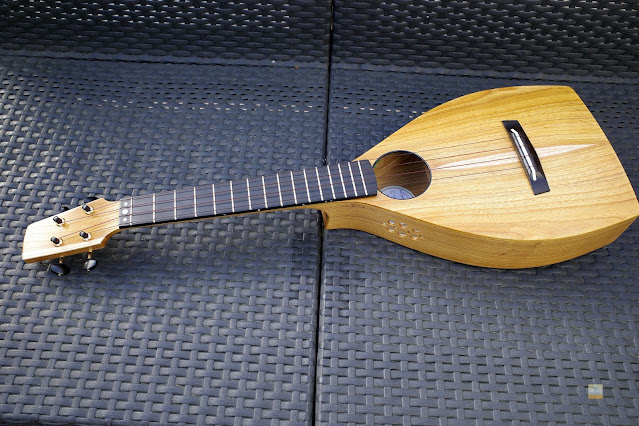

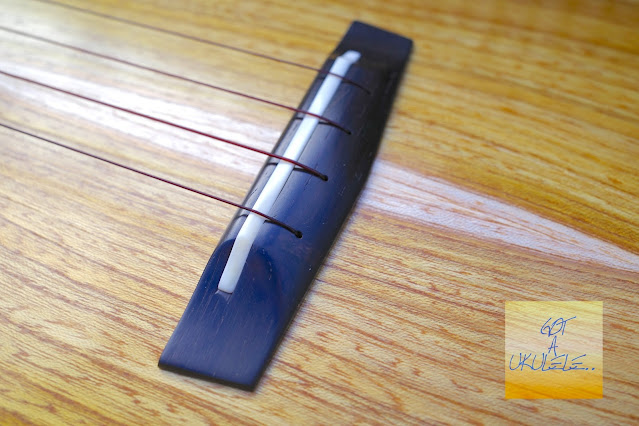

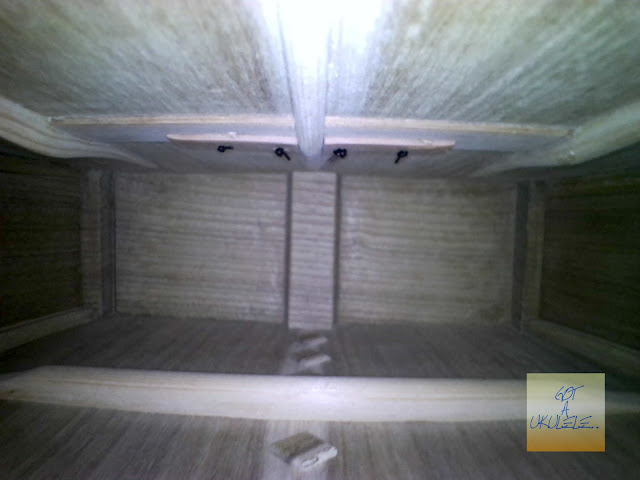

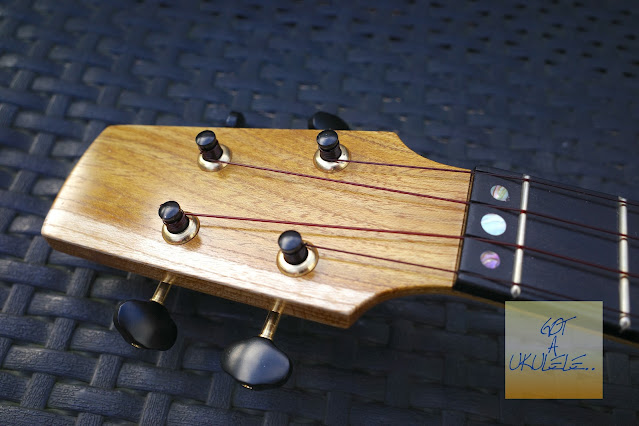
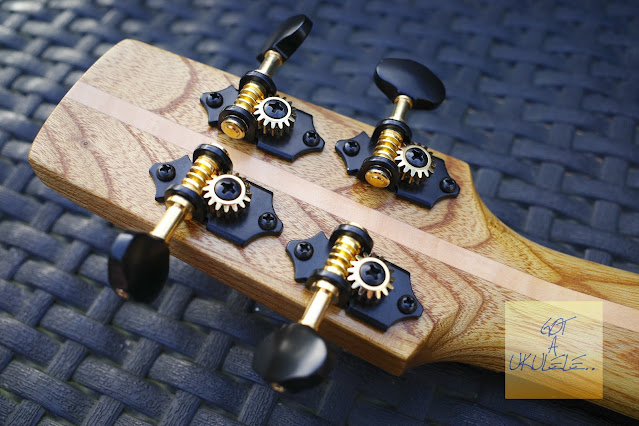




If I could I would! The finish is ace, the sound is amazing, the quality speaks for itself. Your humble luthier is far too humble (imo). What an amazing instrument. Thanks to both Luthier and Baz for trusting their gut instinct and getting reviewed.
ReplyDeleteStunning.
ReplyDelete£600.the price of a fireball. Fireball is lovely but no competition for this my opinion of course. What a awesome looking and sounding instrument.
Not even close
DeleteAnother fluke ripoff
ReplyDeleteHow??? Because it's a paddle shape? Paddle shaped ukes existed before Flukes did. The rip offs are the ones that use plastic backs. This doesn't.
DeleteCurious about the zero fret. In your photos it looks as if he used the same size (height) fret wire for the zero fret as the other frets - true? Most builders I've seen lately use a taller fret wire for their zero frets, though it really shouldn't be necessary. I just got done sanding down the zero fret on a Magic Fluke to get the first fret action down to 0.5 mm, and it was quite a pain - not something I'd want to have to do as part of a typical setup.
ReplyDeletelooks same height - but think that works because the strings are not then going up and over a nut, rather sloping down immediately. The action at the nut on this is absolutely perfect.
DeleteLovely stuff! Thanks for another great review, Barry! What a marvellous instrument. As someone who's worked with wood for many years (as a hobbyist carpenter and woodturner) I've always wanted to work with laburnum but never managed to get my hands on any. So, I was intrigued. What was surprising, though, was that the wood in this beauty is so light in colour. Laburnum is normally distinguished by having a very light sapwood and very (often VERY very) dark heartwood. Looking closely at the grain in your photos, I'd say it looks far more like elm (which I HAVE worked with)! Either way -- laburnum or elm -- it's not a common wood to use on an instrument, particularly a ukulele. Fascinating!
ReplyDeleteI think it's the best-sounding uke you have featured (an easy on the eye too, with a finish that begs to be touched!). I am Intrigued by the "value for money" score, which is "only" 9.5... What would it take for it to be 10?
ReplyDelete